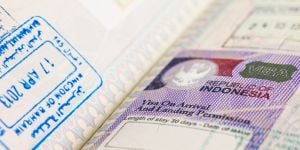
Donald Trump's re-election has taken many by surprise. As some Americans grapple with the outcome, others are celebrating his return to power. Expatriates and potential immigrants are particularly puzzled by the enigmatic "Project 2025." What immigration policies can we expect in the coming years?
Navigating Trump's second term: Immigration tensions and policy uncertainties
Immigration was a central theme of Donald Trump's campaign, and with his re-election, concerns among immigrants about "Project 2025" and its potential to restrict immigration are escalating. Mexican President Claudia Sheinbaum has been reassuring, emphasizing the continuation of strong economic ties with the United States despite Trump's vows to address the "wave of Mexican immigration."
French legislator Roland Lescure, representing North American expatriates, expressed pessimism on French public television on November 6, 2024. He highlighted Trump's plans for stringent immigration controls, emphasizing the impact on all expatriates: "Remember, all French living here are immigrants."
Questions loom about whether Trump's immigration policies will mirror the hardline approach of his previous term. Notably, his administration's 2017 "Muslim ban," which prohibited entry to the US from seven predominantly Muslim nations citing terrorism concerns, and the "Remain in Mexico" policy, which required Mexican asylum seekers to wait in Mexico for their US court proceedings, may see a resurgence.
Tightening borders: Trump's plan for a historic deportation plan
In his campaign, Trump announced plans for "the largest deportation operation in US history." Echoing his first term's commitment, he likely intends to continue building the wall between the US and Mexico, promising to boost the border control budget.
Trump also aims to overhaul the birthright citizenship policy. He proposes to terminate automatic US citizenship for children born in the United States to undocumented parents, a measure that would challenge the 14th Amendment of the US Constitution.
Visa uncertainties following Trump's re-election
Holders of H-1B visas, along with those on F-1 and H-4 visas, face a period of uncertainty following Trump's re-election. His first term saw a significant tightening of these visas, with H-1B visa refusal rates soaring from 4% to 17% and L-1 visa refusals climbing from 12% to 28%. Trump's proposed shift to a point-based visa system, akin to those in Australia and Canada, suggests a potential upside for skilled immigrants, aligning with his focus on curbing illegal immigration—a stance some argue could favor legal pathways.
Yet, optimism is not universal. The "Buy American and Hire American" executive order from his previous term, which tightened visa restrictions, will likely make a comeback. This could mean even stricter requirements for H-1B visas, reduced temporary visa quotas, and increased challenges in securing a Green Card.
Education and employment: New challenges for expats in the USA
Expatriates are particularly concerned about their ability to secure and renew residence permits. Spouses holding H-4 visas are anxious about their future, as Trump has expressed a preference for employment-based over family reunification immigration policies. In his previous term, he proposed revoking work permits for H-4 visa holders. This could potentially tighten further, affecting recruitment conditions for foreign nationals.
International students are also bracing for potential increases in tuition and a possible reduction in student visa allocations. Indian expatriates, who comprised over 140,000 visa recipients in 2023 and represent the largest demographic of international students in the US, have significant concerns about these changes.
Under Trump's "America First" employment policy, companies may find it more difficult to hire foreign workers. Nevertheless, those with temporary work permits are adopting a wait-and-see approach, holding off on any immediate plans to leave the US until the new immigration policy landscape becomes clearer.
State control of education: Trump's vision for expat children
Donald Trump has proposed significant changes to the US education system, including his claim to abolish the Department of Education to reduce federal spending, leaving the management of education solely to the states. This move, however, is expected to place a heavier financial burden on state budgets, especially as Trump also aims to slash funding for institutions he believes are "indoctrinating youth" with a curriculum focused on racism, US history, and gender theory. These budget cuts and policy shifts could profoundly affect the educational landscape for expatriate children.
Evaluating Trump's impact on foreign entrepreneurs
Donald Trump's "America First" policy, which promotes protectionism, aims to renegotiate trade agreements with Canada, Mexico, Europe, and China to stimulate the US economy and curb inflation. Trump's commitment to lowering taxes is expected to help finance these domestic initiatives. However, foreign entrepreneurs face potential challenges due to his administration's plan to impose a 10% to 20% increase in tariffs on all imports, with even higher rates on goods from Mexico and China. For example, US car manufacturers relocating production to Mexico might encounter a staggering 200% tax. Economists caution that such tariff hikes could provoke retaliatory measures from other nations.
Conversely, entrepreneurs in the artificial intelligence sector may find an advantageous environment under Trump's deregulatory policies, which are seen as promoting innovation and maintaining the USA's competitive edge in AI investment and development.



















